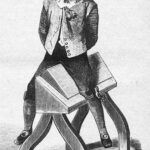15 September 1679: The election at York for the Exclusion Bill Parliament is devolved to more convenient locations
John Reresby. 1875. The Memoirs of Sir John Reresby of Thrybergh, Bart., M.P. for York, etc., 1634-1689. Ed. James J. Cartwright. London: Longmans, Green, and Company. Get it:
.Unedited excerpt
If an excerpt is used in the book, it will be shorter, edited and, where applicable, translated.
September 14. I went for York to choose knights of the shire, and had ordered my friends that went from this side, and would vote for Sir John Kaye, to meet me at Tadcaster. There appeared about 500 freeholders; but the whole number from several parts that accompanied him into York that day was believed near 6,000. Finding the next day that the polling of so many persons, as appeared on all sides, would prove very tedious, and most chargeable to Sir John Kaye, who stood single against the two lords who joined purses and interests together, I proposed that they should all return home, and the poll be adjourned to the next market towns that lay most convenient for them; naming four for the West Riding, two for the North, and two for the East, with certain days when to appear to be polled. All which was well accepted as well by the gentlemen as the freeholders, whose respective occasions made them glad to be at their own houses, and to do their business nearer.
Comment
Comment
In the event Yorkshire’s few thousand voters elected Henry Fairfax, 4th Lord Fairfax of Cameron and Charles Boyle, 3rd Viscount Dungarvan to the Exclusion Bill Parliament (Henning 1983). It was all too much for at least one of them:
Captain Pockly fell ill at the shouting at York Sept. 15 1679, died at Mr. Dawson’s in York the week after (Heywood 1881).
OED says that a shouting was “an election carried out by acclamation,” presumably a reference to Plutarch:
The senators were at first appointed by Lycurgus himself, as I have said, from those who shared his counsels; but afterwards he arranged that any vacancy caused by death should be filled by the man elected as most deserving out of those above sixty years of age. And of all the contests in the world this would seem to have been the greatest and the most hotly disputed. For it was not the swiftest of the swift, nor the strongest of the strong, but the best and wisest of the good and wise who was to be elected, and have for the rest of his life, as a victor’s prize for excellence, what I may call the supreme power in the state, lord as he was of life and death, honour and dishonour, and all the greatest issues of life. The election was made in the following manner. An assembly of the people having been convened, chosen men were shut up in a room near by so that they could neither see nor be seen, but only hear the shouts of the assembly. For as in other matters, so here, the cries of the assembly decided between the competitors. These did not appear in a body, but each one was introduced separately, as the lot fell, and passed silently through the assembly. Then the secluded judges, who had writing-tablets with them, recorded in each case the loudness of the shouting, not knowing for whom it was given, but only that he was introduced first, second, or third, and so on. Whoever was greeted with the most and loudest shouting, him they declared elected (Plutarch 1914).
But I think it more likely that Heywood had read John Milton’s recommendation, some 20 years before, that the Commonwealth
well qualify and refine elections: not committing all to the noise and shouting of a rude multitude, but permitting only those of them who are rightly qualified, to nominate as many as they will; and out of that number others of a better breeding, to choose a less number more judiciously, till after a third or fourth sifting and refining of exactest choice, they only be left chosen who are the due number, and seem by most voices the worthiest (Milton 1890).
Something to say? Get in touch
Similar
 2 July 1644: Henry Slingsby of the Royalist York garrison recounts Prince Rupert’s defeat at Marston Moor today, which ends Charles I’s hopes in the north
2 July 1644: Henry Slingsby of the Royalist York garrison recounts Prince Rupert’s defeat at Marston Moor today, which ends Charles I’s hopes in the north
Comment
Comment
Something to say? Get in touch
Search
Donate
Music & books
Place-People-Play: Childcare (and the Kazookestra) on the Headingley/Weetwood borders next to Meanwood Park.
Music from and about Yorkshire by Leeds's Singing Organ-Grinder.



 Bluesky
Bluesky Extwitter
Extwitter